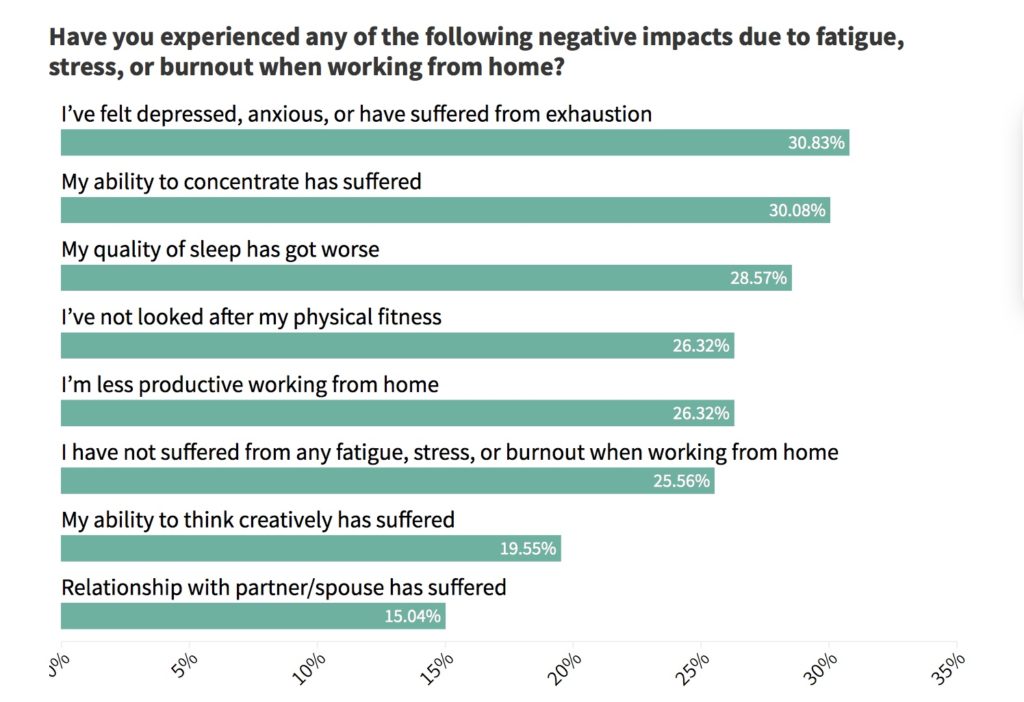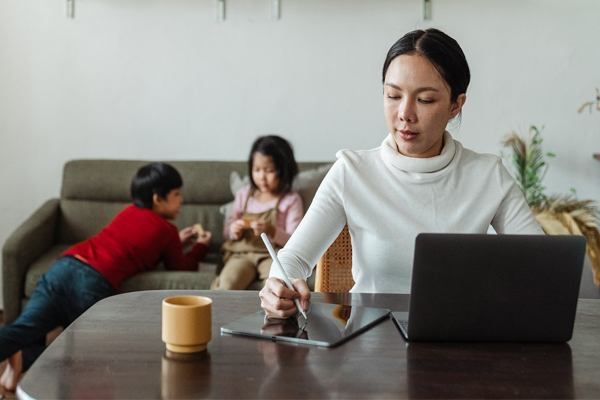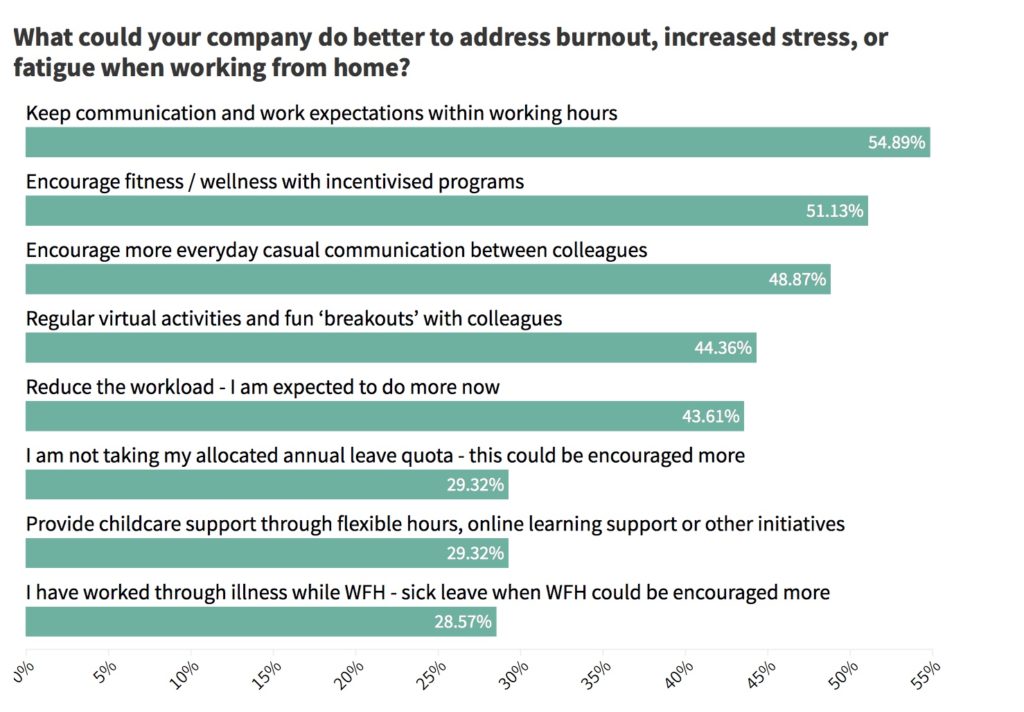The majority of UK staff, particularly parents, working from home are fatigued from an ‘always on’ culture since the pandemic began, reveals a new study.
According to the research carried out by virtual team building company Wildgoose, 55% of UK are struggling to keep their workloads within working hours. This has resulted in 74% of UK employees suffering negative effects of fatigue, stress and/or burnout since home working began amid the pandemic. Additionally, working parents are bearing the brunt of the working from home ‘fatigue cycle’.
The increasingly blurred lines between work and home are creating a ‘cycle of fatigue’ for UK employees, and the effects are being felt from intern level to the boardroom, noted the Wildgoose study. It is encouraging employers and decision makers to break the ‘fatigue cycle’ by adapting their HR and employee wellbeing programmes to address the situation.
MENTAL HEALTH IMPACT
The 2021 Working from Home Study asked employees from UK companies how working from home has impacted them; whether they have been able to keep a good work/life balance; and how companies could improve home working practices. Around 44% of employees confirmed that they have a heavier workload since working from home; and have asked for it to be reduced. Additionally, almost a third (31%) have seen a direct impact on their mental health; stating that they have felt depressed, anxious or suffered from exhaustion. The survey also revealed that:
- 30% cannot concentrate on tasks as well as they used to.
- 29% are not sleeping as well as they used to.
- 26% admit to being less productive during the day.
- 26% have felt their physical health has been impacted.
- 20% believe their ability to think creatively has suffered.

WORKING PARENTS MOST AFFECTED
Working parents were found to be particularly susceptible to fatigue and feeling ‘always on’, with over four in five (81.25%) stating that they had suffered when working from home. With the current lockdown closing schools, parents must also provide additional educational support for their children. The survey also revealed that 42% of parents want their employer to step in to provide childcare support through flexible working hours, online learning support, or other initiatives.
When asked about the negative effects they felt when working from home, 25% of parents reported that their quality of sleep had worsened; and 28% went as far as to say that they had felt depressed, anxious or exhausted.

The study also revealed that more employees are actually working through sickness; and not always taking sick leave to tackle physical or mental illness. In fact, 29% of employees stated that they had worked through illness. HR teams therefore need to make sure that employees take sick leave when needed; and effectively communicate the company’s position on sick leave when working from home.
Medium-sized companies have the highest rate of employees who have worked through illness while working from home (42%). Unsurprisingly, employees from these companies also reported having the greatest workload; with 58% stating that their workload had increased workload over the last year, while working from home.
DESIRED EMPLOYER RESPONSE
So how can companies respond to better address work-related burnout, increased stress and fatigue? The research revealed how staff want their employers to help. Keeping communication and work expectations within working hours is key, according to 55% of staff. Encouraging fitness and wellness was also suggested by 51%. Around 49% of UK employees stated that everyday casual conversation between employees was needed; while 44% wanted regular virtual activities and fun ‘breakouts’ with colleagues.
Many of the most prominent issues faced by employees working remotely revolve around a lack of social interaction; something that is extremely difficult to make up for when staff are not together in the office, noted the study.

“When people have an unclear mind, overloaded with stress and pressure – there is fatigue and burden to every minute worked,” according to One Thought’s Dr Aaron Turner. He believes that people tend to think about work in a “sped-up” state of mind outside of working hours.
“We tend to overlook the fact that the impact of longer working hours will depend more on the state of mind we are working in. Our state of mind determines the level of stress and distress we feel; how clearly we think and our ability to step back; take a break and even our ability to sleep easily. If you feel ‘always on’ – this suggests you are overthinking,” added Dr Turner.
WELLBEING RECOMMENDATIONS
To help staff, Dr Turner recommends that “HR teams prioritise listening above all else, especially during times like these”. “Make sure your staff know they can come to you with any struggles or issues. Most importantly, listen with an open mind,” he advised. “Do not listen with the intention of solving the problem for them. It will make you a distracted listener and if you want to be of service, listen without an agenda for what you think should come out of the conversation.”
Adding to his comments, Wildgoose Managing Director Jonny Edser stated: “While we’ve all grown used to home working as the pandemic has continued, it continues to present huge challenges in maintaining the right work/life balance. With increased workloads and a worrying trend of working through sickness, people’s jobs are becoming ever more blurred with their home lives at a time when it’s crucial the two remain distinct from each other. The lack of casual communication with colleagues during the working day is making employees feel more isolated and less motivated without the natural ‘breaks’ away from work.”
To facilitate a valuable connection between employees, Wildgoose has created new remote team building activities. “It’s crucial not to underestimate the difference that investing in meaningful interaction can make. As a company we are continuing to innovate by offering remote workforces unique team building activities that reinforce bonds,” concluded Edser. For more information on the report, click here.
A recent US survey reveals similar findings, highlighting a dangerous decline and all-time low in employee mental health and focus.






































